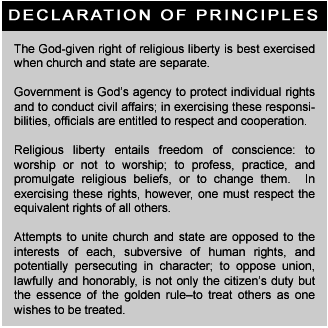Letters
November/December 2002
Getting your Trinity Audio player ready...
No Time for Sabbath
I just wanted to let you and your readers know that while it is wonderful Major Davis had his Sabbath issue resolved, such is not always the case in the military.
I am a 2nd class petty officer in the engine room aboard the U.S.S. Nimitz, with a similar outstanding record. My Navy career will come to an end on July 15, because I refused to stand watch on the Sabbath. I had been accommodated while in port, and it hadn't been made clear that when we went out to sea, I would be expected to work on the Sabbath (with some time given to me to attend services).
I had informed my command from the day I checked aboard of my strict interpretation of Sabbath observance, but in the end, after I attended captain's mast and received a suspended reduction in rank, it was decided that I would be given a general discharge. I simply have faith that this is what the Lord wants and feel that perhaps He hardened the captain's heart like Pharaoh's.
Morgan Caffey, e-mail
A poignant letter from a serviceman faithful to his principles and suffering as a result. There is a largely untold story of faithfulness by servicemen and women, who stand fast in a context in which individual liberties are somewhat more restricted than in civilian life. Liberty will be covering more of their stories in the future. In fact, with the military buildup that is likely to see its culmination in some action against Iraq, we may be heading also into more cases of conscience issues, including noncombatency and pacifist cases. . Editor.

Churches and Zoning
The Supreme Court has already decreed, in several instances, that we have rights—but those rights may not be used to infringe upon the same, or similar, rights of others. From a planning perspective, it's based on the same philosophy: delineating between a single-family yard sale and a full-blown commercial flea market—a matter of scale. When one person's freedom—of whatever—begins to encroach severely on equally important freedoms of multitudes of others, it's time to decide whose freedom has priority.
When the "Dover amendment" was passed, mega churches didn't, for the most part, exist. In my part of this fine country, the neighborhoods don't object to churches in general, nor to their location within properly infrastructured residential areas—with one caveat. Once a church passes a certain size (current numbers being bandied about are based on sanctuary seating exceeding 500 or so), it is no longer a "neighborhood" church. It has transformed into a regional entity, and its primary thrust—despite its roots—much more closely resembles a business. That being the case, mega churches belong in business or at least office-zoned areas.
I don't believe, nor do I think anyone could realistically argue, that the framers of the Constitution intended—in their guarantee of freedom of religion—that the body of a church would have the rights to usurp the "life, liberty, and pursuit of happiness" of multitudes of others. When a church decides to locate a building that occupies 60,000 square feet in the center of a marginally infrastructured single-family neighborhood—evidently not giving a whit about the impact it may have on surrounding land values or lifestyle—it is the point of ceasing to becoming one of the moneychangers.
NORM FLOYD
Planning Commission Member
Little Rock, Arkansas.
The principle of religious liberty surely has not changed so much that we can ever justify the exclusion of churches and religion from our communities. However, our society is under stress, and the shifting demographics and decentralization of much social activity can produce an anomaly such as a mega church of "out-of-towners" in a small community. Even so, laws and principles should hold sway over protective tendencies and prejudice. Editor.